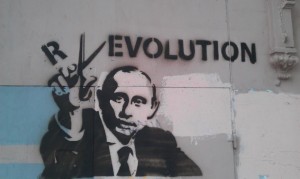UPDATE (1:15 pm ET): Alexey Navalny (@navalny), a top blogger and critic of the Putin regime, has been arrested in Moscow.
Protestors are gathering on Pushkin Square in Moscow against widespread fraud in yesterday’s Russian presidential election for what could be the largest anti-government movement since the fall of the Soviet Union. Former Guardian Moscow correspondent Luke Harding has called this moment newly restored President Vladimir Putin’s “Brezhnev moment,” the moment where Putin stops bearing any semblance to a truly elected leader:![]()
Sunday night was Vladimir Putin’s Brezhnev moment. It was when he ceased simply being an elected leader and segued towards a lifetime presidency. Having neatly sidestepped the rules by doing a stint as prime minister (no Russian leader can serve more than two consecutive presidential terms) Putin can now go on and on. Brezhnev did 18 years, Stalin 31. Despite the whispers of revolution lapping at the Kremlin’s walls, who would bet against Vladimir matching Leonid?
Julia Ioffe has a thoughtful column in Foreign Policy today that sets forth the fundamental choice that Putin will have to make in the days ahead in response:
What Putin decides to do come March 5 is “the central question, not because Putin decides everything in politics on March 5 but precisely because he can no longer decide everything himself,” says political consultant Gleb Pavlovsky, who worked on Putin’s 2000 presidential campaign but was fired by the Kremlin in the last year. “It’s become a very complicated scene.” The way Pavlovsky sees it, there are two possible paths: modernize and reform the political system or “play the tsar.” The first option is the more difficult one, but should Putin choose the second door, Pavlovsky predicts, “He’ll become a prisoner of his own system, completely out of touch with reality, locked in the Kremlin and with his minions ruling in his name. And this is the worst possible outcome.”
I would put it in even starker terms: if the protests gather the kind of momentum that’s being expected, Putin will have to choose between Iran 2009 and Tunisia 2011. Putin can “play the tsar” (which is much the same in this context as playing the ayatollah) and use brute force to kill, imprison and scare away the opposition, but in doing so will only delegitimize his regime further in the eyes of the opposition, of the international community and within the Russian elite. Putin can compromise with the opposition, but risks a slippery-slope that leads to his downfall (much like deposed Tunisian president Zine El Abidine Ben Ali) or, at the very least, the kind of embarrassing electoral re-run that occurred in 2004 after the fraudulent Ukrainian elections spawned the “Orange Revolution.”
Either result would sharply reduce Putin’s current position of strength, which should make the next 12 hours fascinating for Kremlinologists.
In the meanwhile, as protests are scheduled to get underway, we have an indication of what the future might hold:



